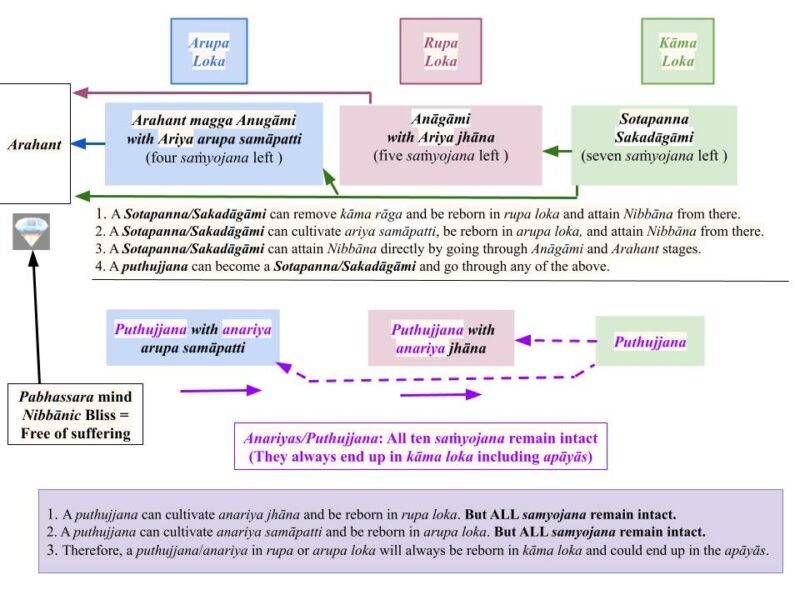- This topic has 2 replies, 3 voices, and was last updated 1 year ago by
TripleGemStudent.
-
AuthorPosts
-
-
March 25, 2024 at 11:53 am #48727
Sammasambodhi Gami
Participant“Dukkha” is generally translated as “suffering”. But in Buddha Dhamma, the deeper meaning of Dukkha is not physical suffering.
As majority of the people in this world already know this basic fact that our life is full of suffering. There is no need of a Lord Buddha to teach us this! People already know these things. As long as we have a physical body… old age, sickness and death can not be avoided.
In the Dhammacakkapavattana Sutta, Lord Buddha clearly said that “dukkha” is actually “pancupadanakkhanda”.
So in the dispensation of Lord Buddha, dukkha means pancupadanakkhanda. (not the physical pain or suffering)
Hence in the four Noble Truths:
(1) Dukkha sacca is the Noble Truth of “dukkha = pancupadanakkhanda”
(2) Dukkha samudaya sacca is the Noble Truth of how the pancupadanakkhanda arises (what are the causes)
(3) Dukkha nirodha sacca is the Noble Truth of stopping the arising the of pancupadanakkhanda
(4) Dukkha nirodha gamini patipada is the Noble Truth of the path leading to the cessation of pancupadanakkhanda
When the Arahant stage is attained, pancupadanakkhanda stops arising (mental suffering stops). After the death of the physical body of an Arahant, not even the pancakkhanda arises. They are not born in any realm. Hence no future suffering of any kind (neither mental nor physical). That is Parinibbana. The Arahant is said to have merged with the Nibbana dhatu forever, never to arise again!
1 user thanked author for this post.
-
March 25, 2024 at 12:24 pm #48729
Lal
KeymasterExcellent!
Another (related) way to look at “dukkha” is to see that as long as we crave pancupadanakkhandha (i.e., perceived “pleasures” in this world), we are moving away from the “suffering-free pabhassara mind” and to more suffering.

An average human (puthujjana), unaware of Buddha’s teachings, is trapped in the birth/death Sansaric process.
1 user thanked author for this post.
-
March 25, 2024 at 7:42 pm #48737
TripleGemStudent
ParticipantI have been trying to look into the etymology of “dukkha”. On wikipedia, it mentions: “the term dukkha has often been derived from the prefix du (“bad” or “difficult”) and the root kha (“empty,” “hole”), meaning a badly fitting axle-hole of a cart or chariot giving “a very bumpy ride,it may actually be derived from duḥ-stha, a “dis-/ bad- + stand-“, that is, “standing badly, unsteady,” “unstable.”Joseph Goldstein, American vipassana teacher and writer, explains the etymology as follows:The word dukkha is made up of the prefix du and the root kha. Du means “bad” or “difficult”. Kha means “empty”. “Empty”, here, refers to several things—some specific, others more general. One of the specific meanings refers to the empty axle hole of a wheel. If the axle fits badly into the center hole, we get a very bumpy ride. This is a good analogy for our ride through saṃsāra.
The meaning of su is quite apparent to me, but I’m not very sure what “kha” is?What I can find and other materials not mentioned for shorter posting:Source: BuddhaSasana: Concise Pali-English Dictionarykha : (nt.) space; sky.Source: Sutta: The Pali Text Society’s Pali-English DictionaryKha, syllable & ending, functioning also as root, meaning “void, empty” or as n. meaning “space”; expld. by Bdhgh with ref. to dukkha as “khaṃ saddo pana tucche; tucchaṃ hi ākāsaṃ khan ti vuccati” <abbr title=”Visuddhi-magga”>Vism. 494.—In meaning “space, sky” in cpd. khaga “sky-goer”PD post:“Dukkha (dukha+khya) means there is hidden suffering AND that suffering can be eliminated (khya is removal”.Would like to ask for others teachings or explanations on other possible meanings of “kha” that I might have missed or not brought up.
-
-
AuthorPosts
- You must be logged in to reply to this topic.

